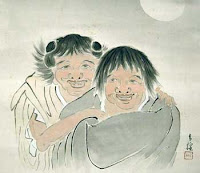----------------------73. Full of Life, Now
Full of life, now, compact, visible,
I, forty years old the Eighty-third Year of The States,
To one a century hence, or any number of centuries hence,
To you, yet unborn, these, seeking you.
When you read these, I, that was visible, am become invisible;
Now it is you, compact, visible, realizing my poems, seeking me;
Fancying how happy you were, if I could be with you, and become your comrade;
Be it as if I were with you. (Be not too certain but I am now with you.)
Walt Whitman, from Leaves of Grass

73. Lleno de vida ahora
Lleno de vida ahora, compacto, visible,
Yo, cuarenta años de edad el octogésimo tercer año de los estados,
A uno un siglo más tarde, o cualquier número de siglos más tarde,
A ti, aun sin nacer, estos, buscándote..
Cuando los leas, yo, que era visible, me he vuelto invisible;
Ahora eres tú, compacto, visible, actualizando mis poemas, buscándome;
Imaginando lo feliz que serías, si yo pudiera estar contigo, y me haría tu compañero;
Sea como si estuviera contigo. (No estés muy seguro que no esté yo contigo ahora.)
Walt Whitman, de Leaves of Grass (Hojas de hierba)
traducción al español de Rafael Jesús González 1980
traducción al español de Rafael Jesús González 1980
Love Note to a Teacher
(on the bicentennial of the U.S.)
(on the bicentennial of the U.S.)
I, forty years old the 200th year of the States,
-------pick leaves of grass & wear them
-------in your honor,
------------------------Walt Whitman;
---your dream shows signs of coming to pass.
A great seer from the East walks among us
giving words said with the tongue of the mind,
a great seer in union with the Lord of Dissolution.
& your words are vindicated
& the flowers bloom
& the waters of the bay are holy.
Teacher: the width of my breast proves your own
--------but I do not destroy you;
------------honor does not destroy but augments.
----What is destroyed is the chaff,
----the useless equipage
----that burdens my affections.
--------We simplify, Walt Whitman —
------------we simplify & enrich,
----------------Walt Whitman.
-----------------------© Rafael Jesús González 2008
----------------------(Creative Intelligence 6; London; October 1975;
-------------------------------------author’s copyrights.)

Nota de amor a un maestro
(en el bicentenario de los EE. UU.)
(en el bicentenario de los EE. UU.)
Yo, cuarenta años de edad el dúo centeno año de los estados,
---------pisco hojas de césped y las llevo
---------en tu honor,
-----------------------Walt Whitman;
---------tu sueño da señas de cumplirse.
Un gran profeta del oriente camina entre nosotros
esparciendo palabras dichas con la lengua de la mente,
un gran profeta en unión con el Señor de la disolución
y tus palabras son vindicadas
y las flores florecen
y las aguas de la bahía son benditas.
Maestro: la anchura de mi pecho pone a prueba la tuya
-----------pero no te destruyo;
------------------el honor no destruye mas aumenta.
----Lo que se destruye es la cáscara,
----el equipaje inútil
----que cargan mis cariños.
--------Simplificamos, Walt Whitman —
-------------simplificamos y enriquecemos,
-----------------Walt Whitman.
-----------------------© Rafael Jesús González 2008
 -
-










